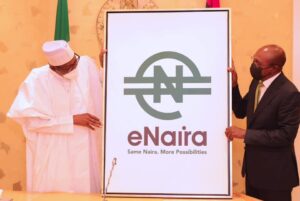Joshua Yousouph
Five months after the official launch of the e-Naira, findings by Shipping Position Daily have revealed that many stakeholders in the nation’s maritime industry are yet to be abreast of its potential. This is even as they called for breathing space for proper sensitization on the initiative for efficiency and effective usage among clearing agents and shippers.

Recall that on 25 October 2021, Nigeria became the first country in Africa to introduce Africa’s first Central Bank Digital Currency (CBDC), with the launch of the e-Naira at the State House in Abuja by President Muhammadu Buhari.
Buhari in his speech had said that e-Naira would increase remittances, foster cross-border trade, improve financial inclusion and enable the government to make welfare payments more easily. Alongside innovation, he said the adoption of a CBDC could improve economic activities and increase Nigerian GDP by $29bn over the next 10 years.
Nigeria has so far launched two mobile applications – e-naira speed wallet and e-naira merchant wallet – on Google Play Store and Apple store for the usage of digital currency.
However, checks by Shipping Position Daily have revealed that many Nigerian maritime stakeholders are yet to actually know the usefulness.
In a chat with the President, Shippers Association of Lagos State (SALS), Rev. Jonathan Nicole, he declared that e-naira is still alien and foreign to the ears of so many people, especially shippers. He submitted that many shippers are not yet aware or fully sensitized on the potentials of e-naira, adding that the e-naira has nothing to do with shippers since they trade on Credit terms and foreign exchange in most cases.
Nicole also lamented the multiple electronic/technological-powered financial instruments introduced by the government, noting that the system is porous and had made many shippers scared of using those platforms. He also said there is a high risk of fraudulent activities which may lead to a great loss of capital.
He however called on the Central Bank of Nigeria (CBN) and Commercial banks to adequately sensitize the public and its customers on the potential and benefits of e-naira, particularly to shipping and maritime at large. Nicole also noted that stakeholders should be given breathing space to get used to the known electronic financial platforms and instruments before introducing new ones.
In his words: “It is still foreign in the ears for so many people. Most people prefer to transact in cash because the system is porous with the fear of losing their money due to lack of security. Someone lost his phone and within an hour, they emptied his account. It shouldn’t be so. There should be at least a year of sensitization before it is introduced to the market.
I don’t even know what e-Naira means. I have not seen one. If they want to spend electronic or paper naira, they should let us know. It is something the Central bank Nigerian or Commercial banks should sensitize the public and their customers about. The e-naira has nothing to do with shippers’ we are trading on Credit terms in most cases. It is when it comes into the country that we have problems with foreign exchange. If we are dealing directly with the bank on foreign exchange or even the black market, we are not going to use e-naira.
“All of these instruments came out at the same time and people are confused. Why is the Government introducing so many things at the same time? They should introduce it one after the other. At least people should get used to one before introducing the other. We are appealing to them to allow us to have a breathing space from one system to another instead of rushing Nigerians into issues that are foreign to us” Nicole stated.
Checks by Shipping Position Daily also revealed that many clearing agents still don’t know what the e-naira entails. Speaking with our correspondent last week, several clearing agents noted that they are yet to understand the concept of e-naira, noting that they have not started putting the platform into use.
Read Also: Lekki Deep Seaport To Commence Activities Sept.- FG
A clearing agent, Mr. Pius Ujubuonu noted that there is no infrastructure provided to aid electronic transactions in Nigeria. He decried lack of stable power, incessant breakdown of network servers, and the porosity and ineffectiveness of the system, noting that it has discouraged many clearing agents from carrying out electronic transactions except on trusted platforms.
“Before you go into any new venture, there certainly has to be proper planning. The implementer has to take certain steps like Change Management Initiatives as seen in social psychology. This is when stakeholders such as the producers and consumers, direct or indirect are brought in, introduced, and educated on the usefulness of the initiative setting examples of where those initiatives are working. They should also provide the necessary infrastructure.
“You cannot talk about anything ‘electronic’ in Nigeria without stable power. Majority of the things you need to keep the Server and other infrastructure required are the internet and satellite-powered devices. We must have them working first. We experience server failures in the morning, afternoon and evenings almost two times in a week and sometimes 10 times in a month if not more. How will it encourage e-transaction and e-trade or even e-valuation as introduced by the Customs? A lot of things are at fraught with irregularities. I don’t think it can impact in any way. Majority of people don’t even know that there is something like that” Ujubounu concluded.
Kindly like us on Facebook















